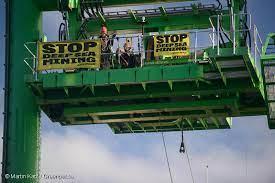
By Nick Young
https://www.greenpeace.org/aotearoa/press-release/deep-sea-miners-take-g...
Would-be deep sea miners The Metals Company has launched legal proceedings against Greenpeace International for an ongoing peaceful protest at sea in the Pacific Ocean, in an attempt to silence environmental concerns about deep sea mining. NORI, a wholly-owned subsidiary of The Metals Company (TMC), a Canadian company sponsored by the Pacific island nation of Nauru, has filed for an injunction to try to stop Greenpeace International’s peaceful protest, which is now into its seventh day.
A hearing before a Dutch court is due at 14:30 CET today. NORI are seeking an immediate halt to the peaceful protest, asking for the judge to set a fine of up to €10 million if the protest continues. In correspondence, NORI said the protest involving two kayaks, two small boats and a five-person climb team from Greenpeace International has cost the company “nearly a million euros a day”, and that “the whole project is delayed”. The writ submitted by NORI states that if “Greenpeace is not prohibited from stopping its actions, this campaign risks failure and would have to be redone at a later date.”
“Two kayaks, two small boats and five climbers have rocked this wannabe extractive industry to its core. This is the importance of peaceful activism and bearing witness to an industry that has always operated in the shadows. We will not look back and regret standing up when we had the chance to stop deep sea mining from ever starting. This industry knows the writing is on the wall for them and they know we won’t stay silent,” says Greenpeace International Stop Deep Sea Mining campaigner Louisa Casson, aboard the Arctic Sunrise.
NORI’s legal suit is a response to a peaceful protest by Greenpeace International activists prevented the MV Coco, a ship being used by TMC, from conducting exploration activities in a deep sea mining contract area. The company has publicly stated this expedition will help them finalise the first-ever deep sea mining application.
TMC has repeatedly stated their intention to apply to mine the international seafloor after July 2024, despite growing political opposition and ongoing negotiations at the International Seabed Authority. While trying to present this expedition as “purely research”, TMC CEO Gerard Barron was quoted in the past week saying: “we don’t see a situation in front of us at the moment where we would not launch that application along that timeline”. In its last impact report the company has also recognised deep sea mining “cannot be sustainable”.
TMC is facing multiple legal cases including a class action lawsuit filed by shareholders for making false statements and failing to disclose information. In addition, TMC has received two delisting notices from the NASDAQ stock exchange in the last 12 months after their share price stayed below $1 for over 30 working days, twice. The company reported a net loss of $12.5 million for the third quarter of 2023, with total cash in hand reported as approximately $22.5 million at September 30, 2023.
Casson continued: “TMC is a desperate company running out of cash and ways to disguise the lack of public support for its plans to open up the world’s last untouched ecosystem. Its expedition in the Pacific is just a box ticking exercise: TMC said it will file for a permit to go mining regardless of the mounting scientific warnings and governments’ negotiations at the International Seabed Authority. This is the company that used a legal loophole to try to force the start of commercial deep sea mining this year, and is still pressing ahead with what could be entirely unregulated mining in the deep ocean.”
NORI stated that the suit has the support of the supposed regulator of the industry, the International Seabed Authority (ISA). NORI’s writ of summons submitted on 27 November states: “ISA and the Republic of Nauru support NORI’s claim. They have agreed to state so in writing.” The ISA Secretariat has been criticised for its close relationship with industry, and the writ of summons confirms ISA staff are on board the MV COCO vessel being used by The Metals Company for its industrial exploration.
The ISA Secretary-General has also written a letter to its member states and Greenpeace International, demanding an end to the protest at sea in the light of immediate and urgent threat of serious harm to the marine environment and the safety of life at sea in the Area.
The regulator is also encouraging the Kingdom of the Netherlands to take legal action against Greenpeace International.
Casson says “What threatens the marine environment is the prospect of commercial deep sea mining. The cozy ties between the so-called regulator and the industry are now abundantly clear. States must take clear control of the ISA, put protection of the marine environment front and centre of its work and establish an immediate moratorium on deep sea mining.”
Over 800 scientists and policy experts from 44 countries have recommended that the transition to the exploitation phase be paused until sufficient and robust scientific information has been obtained to make informed decisions as to whether deep-sea mining can be authorised without damage to the marine environment and, if so, under what conditions.
There are now 24 countries, including New Zealand, calling for a moratorium on deep sea mining, which Greenpeace claims is the only responsible way for states to fulfil their obligations under the Law of the Sea Convention to protect the marine environment.
Over 39,000 people have signed a petition calling on the New Zealand Government to support a global ban on deep sea mining. The Labour-led government backed a “conditional moratorium” on seabed mining in international waters, a move which Greenpeace Aotearoa applauded but urged for an even stronger position.
About the author
Nick Young
I've been doing digital at Greenpeace since before Facebook. Now the head of communications at Greenpeace Aotearoa. Follow me on twitter …









